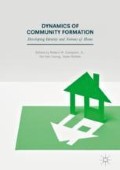Abstract
This chapter provides an ethnographic study of how an urban identity, “fang-nu”, is discursively constructed in the stories of homeownership on Chinese social media. Many homebuyers in China describe themselves as fang-nu (房奴), which literally means “house slave” as they feel like a slave to the house they bought due to the excessive monthly mortgage installments. Drawing on the ethnography of communication, this study examines participants’ stories of home-buying experiences and feelings in a virtual community and explicates the social psychological states of urban Chinese as revealed in their discursive presentation of an urban identity—fang-nu.
“We organize our experience and our memory of human happenings mainly in the form of narrative”
(Jerome Bruner 1991, p. 4)
References
Beaulieu, A. (2004). Mediating Ethnography: Objectivity and the Making of Ethnographies of the Internet. Social Epistemology, 18(2/3), 139–163.
Bruner, J. (1991). The Narrative Construction of Reality. Critical Inquiry, 18, 1–21.
Butler, J. (1990). Gender Trouble: Feminism and the Subversion of Identity. London/New York: Routledge.
Chiang, S.-Y. (2009). Interformative Meaning of Signs: Brand Naming and Globalization in China. Social Semiotics, 19(3), 329–344.
Chiang, S.-Y., & Leung, H. H. (2011). Making a Home in US Rural Towns: The Significations of Home for Recent Chinese Immigrants’ Work, Family, and Settlement in Local Communities. Community, Work, and Family, 14(4), 469–486.
Ellison, N. B., Steinfeld, C., & Lampe, C. (2007). The Benefits of Facebook Friends: Social Capital and College Students’ Use of Online Social Network Sites. Journal of Computer-Mediated Communication, 12(4), 1143–1168.
Gergen, K. J. (1991). The Saturated Self, Dilemmas of Identity in Contemporary Life. New York: Basic Books.
Goffman, E. (1959). The Presentation of Self in Everyday Life. New York: Doubleday.
Goffman, E. (1967). Interaction Ritual. New York: Doubleday.
Graham, S. G. (2014). More Than Friends: Popularity on Facebook and its Role in Impression Formation. Journal of Computer-Mediated Communication, 19(3), 358–372.
Gumperz, J. (1965). The Speech Community. Encyclopedia of the Social Sciences, 9(3), 382–386.
Gumperz, J., & Hymes, D. (Eds.). (1964). The Ethnography of Communication [Special Issue]. American Anthropologist, 66(6), Part II, 137–154.
Hymes, D. (1962). The Ethnography of Speaking. In T. Gladwin & W. C. Sturtevant (Eds.), Anthropology and Human Behavior (pp. 13–53). Washington, DC: Anthropology Society of Washington.
Hymes, D. H. (1972). On Communicative Competence. In J. B. Pride & J. Holmes (Eds.), Sociolinguistics (pp. 269–293). London: Penguin.
Hymes, D. (1974). Foundations in Sociolinguistics: An Ethnographic Approach. Philadelphia: University of Pennsylvania Press.
Johnson, I. (2014, March 17). China Releases Plan to Incorporate Farmers into Cities. New York Times.
Katriel, T. (1985). ‘Griping’ as a Verbal Ritual in Some Israeli Discourse. In M. Dascal (Ed.), Dialogue (pp. 367–381). Amsterdam: John Benjamins Publishing Company.
Li, G. (2006). Don’t Become a Fang-Nu. Standardization of Enterprise (in the Chinese language), 6, 68.
Long, Y. T. (2013). Remarks on the Chinese Housing Problem in an Interview (in the Chinese language). Accessed on 5 Dec 2016 at http://house .hexun.com/2010-04-02/123206456.html
Marciano, A. (2014). Living the VirtuReal: Negotiating Transgender Identity in Cyberspace. Journal of Computer-Mediated Communication, 19(4), 824–838.
Qiao, Z. Q. (2011). From State Property to Private Property: Housing Policy Changes of 60 years in China. China Report (in the Chinese language), 5, 22–23.
Ruelle, O. & Peverelli, P. (2016). The Discursive Construction of Identity Through Interaction on Social Media in a Chinese NGO. Chinese Journal of Communication. Online First at doi: 10.1080/17544750.2016.1217899
Soukup, C. (2004). Multimedia Performance in a Computer-Mediated Community: Communication as a Virtual Drama. Journal of Computer-Mediated Communication, 9(4).
Tidwell, L. C., & Walther, J. B. (2002). Computer-Mediated Communication Effects on Disclosure, Impressions, and Interpersonal Evaluations. Human Communication Research, 28(3), 317–348.
Wei, S. J., Zhang, X. B., & Liu, Y. (2012). Status Competition and Housing Prices (NBER Working Paper No. 18000). Accessed Online on 6 Dec 2016 at http://www.nber.org/papers/w18000
Zhao, S., Grasmuck, S., & Martin, J. (2008). Identity Construction on Facebook: Digital Empowerment in Anchored Relationships. Computers in Human Behavior, 24(5), 1816–1836.
Author information
Authors and Affiliations
Editor information
Editors and Affiliations
Copyright information
© 2018 The Author(s)
About this chapter
Cite this chapter
Chiang, SY. (2018). The Narrative Construction of Fang-Nu (房奴): An Urban Identity in Post-Modern China. In: Compton, Jr., R., Leung, H., Robles, Y. (eds) Dynamics of Community Formation. Palgrave Macmillan, New York. https://doi.org/10.1057/978-1-137-53359-3_7
Download citation
DOI: https://doi.org/10.1057/978-1-137-53359-3_7
Published:
Publisher Name: Palgrave Macmillan, New York
Print ISBN: 978-1-137-53358-6
Online ISBN: 978-1-137-53359-3
eBook Packages: Social SciencesSocial Sciences (R0)

